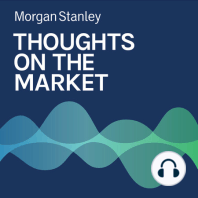4 min listen

Seth Carpenter: The Global Implications of China’s Deflation
Seth Carpenter: The Global Implications of China’s Deflation
ratings:
Length:
4 minutes
Released:
Aug 29, 2023
Format:
Podcast episode
Description
If China economic woes become a true debt deflation cycle, it could export some of that disinflation to the global economy.----- Transcript -----Welcome to Thoughts on the Market. I'm Seth Carpenter, Global Chief Economist for Morgan Stanley. Along with my colleagues, bringing you a variety of perspectives, today, I'll be talking about the global implications of China's economic slowdown. It's Tuesday, August 29th, at 10 a.m. in New York. China's economic woes continue to be center stage. Our Asia team has outlined the risks of a debt deflation cycle there and how policy is needed to avert the possibility of a lost decade. As always, big economic news from China will get global attention. That said, when we turned bullish on China's economic growth last year, we flagged that the typical positive spillovers from China were likely to be smaller this cycle than in the past. We expected growth to be heavily skewed towards domestic consumption, especially of services, and thus the pull into China from the rest of the world would be smaller than usual. We also published empirical analysis on the importance of the manufacturing sector to these global spillovers, and the very strong Chinese growth and yet modest global effects that we saw in the first quarter of this year vindicated that view. Now the world has changed and Chinese growth has slumped, with no recovery apparent so far. The global implications, however, are somewhat asymmetric here. Because we are seeing the weakness now show through to the industrial sector and especially CapEx spending, we cannot assume that the rest of the world will be as insulated as it was in the first quarter. Although we have recently marked down our view for Chinese economic growth, we still think a lost decade can be avoided. Nevertheless, with Chinese inflation turning negative, the prospect of China exporting disinflation is now getting discussed in markets. Much of the discussion about China exporting this inflation started when China's CPI went into deflation in the past couple of months. Although the connection is intuitive, it is not obvious that domestic consumer price numbers translate into the pricing that, say, U.S. consumers will eventually see. Indeed, even before China's prices turned negative, U.S. goods inflation had already turned to deflation because supply chains had healed and consumer spending patterns were starting to normalize. For China to export meaningful disinflation, they will likely have to come through one of three channels. Reduced Chinese demand for commodities that leads to a retreat in global commodities prices, currency depreciation or exporters cutting their prices. On the first, oil prices are actually at the same levels roughly that they were in the first quarter after Chinese goods surged. And they're well off the lows for this year. And despite the slump in economic activity, transportation metrics for China remain healthy, so to date, that first channel is far from clear. The renminbi is much weaker than it was at the beginning of the year. But recent policy announcements from the People's Bank of China imply that they are not eager to see a substantial further depreciation from here, limiting the extent of further disinflation through that channel. So that leaves exporters cutting prices, which could happen, but again, it need not be directly connected to the broader domestic prices within China coming down. So all of that said, the direction of the effect on the rest of the world is clear. Even if the magnitude is not huge, there is a disinflationary force from China to the rest of the world. For the Fed and ECB, other developed market central bankers, such an impulse may be almost welcome. Central banks have tightened policy intentionally to slow their economies and pulled down inflation. Despite progress to date, we are nowhere near done with this hiking cycle. If we're wrong about China, however, should we start to worry about a global slump? Probabl
Released:
Aug 29, 2023
Format:
Podcast episode
Titles in the series (100)
Andrew Sheets: A Second (and Third) Opinion for Equity Markets by Thoughts on the Market